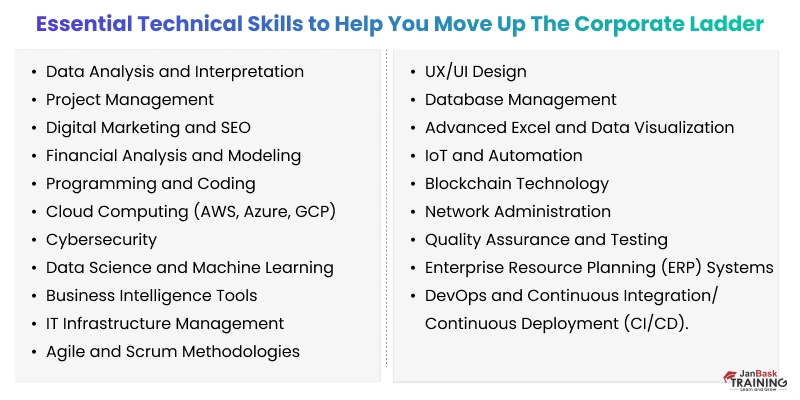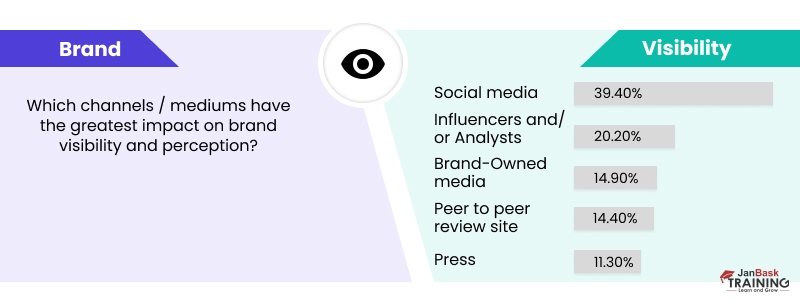Introduction
How often you feel that you are stucked in the corporate world? Have you ever felt, something is holding you back to move up in tech corporate ladder? I guess, many of us might be able to relate with this thought and especially the mid-senior level employees.
If something like this runs in your mind, you should consider studying some professional courses. Yes, today professional certification courses has opened up avenues for upskilling and positioning yourself for success. In this guide, we will explore strategies for advancing your career, and leveraging online courses to fuel your professional growth.
How can Advancing in Your Career Help You?
Before we dive into strategies for climbing the ladder it is crucial to grasp why it holds such importance. Progressing in your career goes beyond prestige or higher income; it involves growth, professional satisfaction, and the chance to make a meaningful impact within your organization. Let’s delve into some reasons why climbing up in a company matters;
- Career Development: Ascending the ladder often leads to responsibilities challenging roles and opportunities, for honing leadership abilities.
- Financial Rewards: Higher-level positions typically come with compensation packages that include salary increments, bonuses, and enhanced benefits.
- Self-growth: As you progress in your career the impact of your decisions and contributions becomes more significant giving you the opportunity to shape the direction of your team or organization. Reaching career milestones can bring gratification boosting your self-esteem and providing a sense of accomplishment. Advancing in your profession can enhance job security by making you more indispensable, to your employer.
Creating a Skill Development Plan
Staying ahead of the curve and climbing the ladder often depends on your ability to continuously acquire new skills. Whether you're aiming for a promotion, looking to switch roles, or simply want to excel in your current position, having a well-structured skill development plan can make all the difference. Below, we'll explore the steps to create a skill development plan that will propel your career forward.
1. Self-Assessment: Know Where You Stand
Before embarking on your skill development journey, it's crucial to assess your current skill set honestly. Take a step back and reflect on your strengths and weaknesses. What are you good at? What areas need improvement? Additionally, seek feedback from colleagues and supervisors to gain valuable insights into your performance. This self-awareness will serve as the foundation of your skill development plan.
2. Setting Clear Goals: Define Your Objectives
Once you've identified areas for improvement, it's time to set clear and achievable goals. Use the SMART (Specific, Measurable, Achievable, Relevant, Time-bound) criteria to define your objectives. For example, instead of a vague goal like "improve communication skills," aim for a specific one like "deliver effective presentations during quarterly meetings by the end of the year."
3. Identifying Relevant Skills: Focus on What Matters
Not all skills are created equal. To make the most of your skill development efforts, prioritize skills that are relevant to your current role or desired career path. Research industry trends and job requirements to pinpoint the skills that will make you stand out.
4. Choosing Learning Resources: Accessing Knowledge
With your goals in mind, it's time to choose the right learning resources. Consider your budget, time availability, and learning style. Online courses, workshops, books, and mentorship programs are all valuable options. Select resources that align with your goals and preferences.
5. Creating a Timeline: Stay on Track
A skill development plan without a timeline is like a ship without a rudder. Create a clear timeline for achieving your goals. Break down your objectives into smaller, manageable steps and assign deadlines. This will help you stay focused and accountable.
6. Consistent Practice: The Key to Mastery
Practice makes perfect. Consistency is essential for skill development. Dedicate time regularly to practice and refine your skills. Embrace the concept of deliberate practice, where you focus on specific aspects that need improvement.
7. Seeking Feedback: Learn and Adapt
Don't be afraid to seek feedback from mentors, colleagues, or experts. Constructive criticism is a valuable tool for growth. Use feedback to make adjustments to your skill development plan and continue to improve.
8. Overcoming Challenges: Persistence Pays Off
Skill development can be challenging, and setbacks are part of the journey. Stay resilient and determined. Identify obstacles and find strategies to overcome them. Remember that the road to mastery is rarely smooth, but persistence pays off.
9. Tracking Progress: Measure Your Success
To ensure you're on the right path, track your progress regularly. Keep a journal, use tracking apps, or create a checklist to monitor your achievements. Celebrate milestones along the way to stay motivated.
Always remember that skill development is an ongoing journey, and with dedication and the right plan, you can unlock your full potential and achieve success in the corporate world. Start your skill development plan today and watch your career soar.
Things That We Should Avoid
Now, let's explore the key things to avoid when creating a skill development plan. Effective skill development is not just about what you do but also about what you should steer clear of to ensure your efforts yield the best results.
1. Lack of Clear Goals
One of the most common mistakes when creating a skill development plan is having vague or undefined goals. Without clear objectives, your efforts can become directionless, leading to frustration and inefficiency. Avoid this by setting specific, measurable, achievable, relevant, and time-bound (SMART) goals that provide a clear roadmap for your development.
2. Overloading Yourself
Attempting to master too many skills at once can overwhelm you and dilute your progress. Avoid the temptation to tackle numerous skills simultaneously. Instead, prioritize a few key skills that align with your career goals and focus your efforts on them. This focused approach allows you to make meaningful progress in each skill area.
3. Neglecting Self-Assessment
Ignoring self-assessment is a grave mistake. Without a solid understanding of your current skill level and areas that require improvement, your skill development plan may lack relevance. Regularly assess your strengths and weaknesses to tailor your plan effectively and make informed decisions about which skills to prioritize.
4. Insufficient Planning
A haphazard or poorly structured plan is unlikely to yield desirable results. Avoid jumping into skill development without careful planning. Create a detailed plan that includes timelines, resources, and milestones. This provides a clear path forward and helps you stay on track.
5. Ignoring Feedback
Failing to seek and accept feedback is detrimental to skill development. Feedback provides valuable insights and helps you refine your skills. Avoid dismissing or ignoring feedback, whether it comes from mentors, colleagues, or self-assessment. Embrace constructive criticism as an opportunity for growth.
6. Inconsistent Practice
Consistency is key to skill development. Irregular or sporadic practice can hinder progress. Avoid neglecting your skill-building efforts for extended periods. Dedicate consistent, focused practice time to maintain and enhance your abilities.
7. Lack of Adaptability
Rigidly sticking to your initial plan, even when circumstances change, can limit your growth. Avoid the trap of inflexibility. Be open to adapting your skill development plan as needed. Industry trends, job requirements, and personal goals may evolve, and your plan should evolve with them.
8. Impatience and Unrealistic Expectations
Skill development is a gradual process, and instant mastery is rare. Avoid impatience and unrealistic expectations. Understand that progress may be incremental, and setbacks are normal. Stay committed and maintain a long-term perspective on your skill development journey.
9. Neglecting Relevance
Focusing on skills that are not directly relevant to your career goals can waste valuable time and resources. Avoid pursuing skills simply because they are trendy or popular. Ensure that the skills you develop align with your current role or desired career path to maximize their impact.
How to Climb the Corporate Ladder
No matter the work experience, previous educational qualifications if you are not ready as per the latest industry benchmarks climbing up the ladder can seem far sighted. Explore ways to get yourself up for the next level
1. Assessing Yourself and Setting Goals
Before embarking on the journey of climbing the ladder it's important to conduct a self-assessment and establish clear career goals. Here's how you can go about it;
- Recognize Your Strengths and Weaknesses: Take time to reflect on your skills, qualities, and areas where you excel. Similarly, acknowledge areas where improvement is needed. Self awareness is crucial for professional growth.
- Define Specific Career Goals: Clearly outline your career objectives. Are you aiming to become a team leader, department head or C suite executive? Setting goals provides a target to focus on.
- Set Realistic Timelines: Determine timelines, for reaching your career goals.Consider both term and long term goals.
Develop an action plan that outlines the steps to achieve your objectives. This plan should encompass skill development, networking and other strategies, for growth.
2. The Importance of Online Certification Programs
The advent of education has completely transformed the way professionals acquire skills and knowledge. Online certification programs provide benefits for individuals aiming to advance in their careers;
- Flexibility: Online courses enable you to learn at your pace fitting your studies into your busy schedule.
- Accessibility: A wide array of courses covering topics are readily available online making it easier to find programs that align with your career aspirations.
- Cost effectiveness: Online courses are often more affordable than, in person training saving you money on tuition fees, travel expenses and accommodation costs.
- Certifications: Successfully completing courses often leads to certifications that can enhance your resume and showcase your expertise to potential employers. Explore top certification for professional empowerment by JanBask Training. Empowering
- Diverse Learning Resources: Online courses offer a wealth of resources including video lectures, reading materials, quizzes and assignments – ensuring a learning experience.
3. Developing In Demand Skills
To excel in your career and advance up the ladder it is crucial to cultivate skills that are highly regarded within your industry and organization. Here are several key skills that can significantly boost your career prospects;

- Technical Skills; Depending on the nature of your profession technical skills such as data analysis, programming or project management can be assets. Online courses provide opportunities for acquiring or improving these sought after skills.
- Leadership Skills; The ability to lead is vital, for progression. Enrolling in courses focused on leadership and management can help you develop the aptitude to lead teams make decisions and inspire others.
- Communication Skills; Effective communication plays a role at all levels of an organization. Enhancing your communication abilities through courses in speaking writing and overall communication can enhance your capability to express ideas clearly and persuasively.
- Critical Thinking; In the world critical thinking and problem solving abilities hold value. Courses that focus on thinking and decision making equip you with the tools to become an asset within your organization.
- Adaptability and Resilience; The capacity to adapt to change while bouncing back from setbacks is essential. Courses centered around resilience and adaptability empower you with strategies for navigating situations successfully.
4. Networking and Cultivating Relationships
In the realm, who you know can be just as important, as what you know. Building a network can open up various opportunities and provide valuable insights. Below are some strategies, for networking;
- Online Networking: Make use of networking platforms like LinkedIn to connect with colleagues, industry peers and potential mentors. Join industry groups. Actively engage in discussions to expand your online presence.
- Attend Events: Take advantage of online webinars, conferences and industry specific events that allow you to network with professionals worldwide. Participate actively ask questions and follow up with the connections you make.
- Mentorship: Look for mentors within your organization or industry who can offer guidance and advice. Some online courses also provide mentorship programs as part of their offerings.
- Give Back: Offer your expertise and support to others in your network. By providing assistance and guidance you strengthen your relationships. Establish yourself as a resource.
5. Self - Branding and Visibility
In todays era personal branding plays a role, in advancing ones career. Your personal brand encompasses your reputation, presence and how others perceive you professionally. Here are some ways to enhance your brand;
1. Optimize Your LinkedIn Profile: Your LinkedIn profile often serves as the impression potential employers or colleagues have of you. Ensure it is complete professional look and highlights your accomplishments and skills effectively.
2. Content Sharing:Share articles, industry insights and your own professional accomplishments, on LinkedIn and other social media platforms. This showcases your expertise. Helps you stay active in your network.

3. Blogging and Establishing Thought Leadership: Consider launching a blog or contributing articles to industry publications. Positioning yourself as a thought leader can boost your credibility and visibility.
4. Online Portfolios: If it aligns with your profession create a portfolio that highlights your work, projects and successes. This serves as evidence of your skills and achievements.
6. Exploring Growth Opportunities
Advancing in your career often requires seeking opportunities for growth. Here are some strategies that can help you identify and pursue these opportunities;
- Express Your Ambitions; Make sure to communicate your career aspirations to your supervisor or the HR department. Let them know that you are keen on taking up responsibilities or aiming for higher level positions.
- Keep an Eye on Internal Job Openings; Stay attentive to any job postings within your company. Often internal candidates are given priority when it comes to promotions and advancements.
- Consider Additional Certifications; Take into account pursuing certifications or qualifications that align with the roles you aspire towards. Online courses can assist you in acquiring the skills and credentials.
- Highlight Transferable Skills; Emphasize skills and experiences that make you a strong candidate for the position you have your sights on. Showcase how your current skill set can bring value to the role.
- Leverage Internal Networking; Utilize your network within the company to gather information about openings and gain insights, into what it takes to thrive in those roles.
7. Demonstrating Leadership Potential
If you want to advance in your career it's crucial not to have leadership potential but to showcase it to decision makers. Here are some ways you can demonstrate your leadership abilities;
- Taking Initiative; Step up. Volunteer for challenging projects assume leadership roles, within teams and actively seek opportunities to showcase your ability to lead.
- Mentoring; If the chance arises, mentor junior. Colleagues. Sharing your knowledge and offering guidance can highlight your leadership skills.
- Leading by Example; Serve as a role model in terms of work professionalism and dedication. Show that you are devoted to the companys mission and values.
- Problem Solving; Approach challenges with a problem solving mindset. Demonstrating your aptitude for finding solutions and making decisions can position you as a leader.
- Communication; Effective leaders are also communicators. Develop your communication skills to express your ideas and vision clearly.
Achieving Work Life Balance
As you strive for success in your career maintaining a work life balance is vital. Burnout can impede progress. Affect well being. Here are some tips for achieving balance;
1. Setting Boundaries
- Establish boundaries, between work and personal life. Remember to prioritize your well being and make time for self care and relaxation outside of work.
- When necessary don't hesitate to delegate tasks or ask for help. Taking on much, by yourself can lead to burnout.
- Make it a priority to engage in activities that promote self care, such as exercise, hobbies and spending quality time with loved ones. Taking care of yourself physically and mentally will enhance your productivity and resilience.
- Improve your time management skills so that you can be more productive during work hours and have time for yourself.
- Consider exploring courses that focus on time management techniques and stress reduction. These resources can equip you with the tools to effectively balance work and personal life.
2. Navigating Office Politics
Corporate environments often involve dynamics. Skillfully navigating these politics is essential for advancing in your career. Here are some suggestions;
- Observe and Learn; Take the time to observe the dynamics within your organization. Understand who holds decision making power and how decisions are made.
- Build Relationships; Strategically cultivate relationships with colleagues and supervisors. Seek out mentors and allies who can offer support and guidance.
- Maintain Professionalism; In the face of office politics uphold professionalism by avoiding conflicts or engaging in gossip.
- Advocate for Yourself; Don't hesitate to highlight your accomplishments and contributions, within the organization. Ensure that your superiors are aware of the value you bring to the company.
- Resolving Conflicts; When conflicts arise it's important to approach them in a manner and actively seek resolution. Demonstrating your ability to handle situations diplomatically can earn you respect, from others.
- Staying Informed; It's crucial to stay updated on company policies, procedures and any changes happening within the organization. Being aware of whats going on can help you navigate the dynamics effectively.
3. Advocate for Yourself
Don't hesitate to highlight your accomplishments and contributions, within the organization. Ensure that your superiors are aware of the value you bring to the company.
- Resolving Conflicts: When conflicts arise it's important to approach them in a manner and actively seek resolution. Demonstrating your ability to handle situations diplomatically can earn you respect, from others.
- Staying Informed: It's crucial to stay updated on company policies, procedures and any changes happening within the organization. Being aware of what's going on can help you navigate the dynamics effectively.
In conclusion
Advancing in your career is a goal for any motivated individual in the United States. By following the strategies outlined in this guide including self assessment, developing skills through courses building a strong professional network establishing a personal brand and demonstrating leadership potential. You will position yourself for success, in your career journey.
The corporate landscape is constantly changing, so its important to invest in growth and adaptability. Online certification courses provide an cost effective way to acquire the knowledge and skills needed to excel in your chosen field.
As you set out on your path to ascend the hierarchy keep in mind that achieving success necessitates commitment, ongoing education and determination. By remaining dedicated, to your objectives refining your abilities and making decisions you can soar to new levels in your career and relish the benefits that accompany it. The journey towards advancing your career commences with the choice to invest in yourself and pave the way, for a future.
FAQs
Q1. What is a corporate ladder? How to move up in a company?
Ans: The corporate ladder is a metaphorical representation of the hierarchical structure within a company or organization. It signifies the various levels or positions within an organization, typically starting from entry-level or junior positions at the bottom and progressing to higher, more senior roles at the top. Climbing the corporate ladder refers to the process of advancing in one's career by moving up through these different levels of authority and responsibility within the organization.
To move up in a company, consistently excel in your current role and actively seek opportunities for additional responsibilities and leadership. Build a strong professional network, communicate your career ambitions, and consider further education or certifications to enhance your qualifications.
Q2. How to climb the corporate ladder? What are some effective strategies for skill development to prepare for the next career level?
Ans: To enhance your skills for career advancement, consider taking online courses, attending workshops, seeking mentorship, and actively participating in relevant projects at work. Additionally, networking and staying updated with industry trends can help you develop the necessary competencies for climbing the corporate ladder.
Q3. How can I balance setting ambitious career goals with maintaining a work-life balance?
Ans: Balancing ambitious career goals with personal life is crucial. To do this, set realistic career timelines that consider your personal commitments. Prioritize your tasks and delegate when necessary. Communication with your employer and colleagues about your career aspirations and time constraints can also help create a more supportive work environment. Remember that achieving career success and climbing the corporate ladder should not come at the expense of your well-being.
Q4. How do I choose the right online certification program to boost my career?
Ans: Selecting the right online certification program is crucial for career advancement. Start by identifying your career goals and the specific skills or knowledge you need to acquire. Research various programs, read reviews, and consider factors such as the program's reputation, accreditation, curriculum, and the opportunities it offers for practical learning. Additionally, assess your learning style to ensure that the program's format aligns with your preferences and schedule. Finally, consult with mentors or industry professionals for recommendations on the most valuable certification programs in your field. You can also explore top certification for professional empowerment by JanBask Training. Book a call with us and we will help you make the right career decision.
Q5. How can I stay informed about company policies and changes within the organization, especially in a rapidly changing corporate environment?
Ans: Staying informed in a rapidly changing corporate environment is crucial for career growth and effectively climbing the corporate ladder. To do this successfully, make use of company communication channels like emails, newsletters, and intranet resources to keep up with policy updates and important announcements. Additionally, actively participate in company meetings, discussions, and training sessions to stay in the loop. Networking with colleagues and supervisors can also help you gather valuable information. Finally, consider setting up Google Alerts or subscribing to relevant industry news sources to stay updated on broader industry trends that may impact your organization. Keeping a proactive approach to information gathering can help you navigate office politics and make informed decisions.
Trending Courses
Cyber Security
- Introduction to cybersecurity
- Cryptography and Secure Communication
- Cloud Computing Architectural Framework
- Security Architectures and Models
Upcoming Class
0 day 10 Jan 2026
QA
- Introduction and Software Testing
- Software Test Life Cycle
- Automation Testing and API Testing
- Selenium framework development using Testing
Upcoming Class
0 day 10 Jan 2026
Salesforce
- Salesforce Configuration Introduction
- Security & Automation Process
- Sales & Service Cloud
- Apex Programming, SOQL & SOSL
Upcoming Class
5 days 15 Jan 2026
Business Analyst
- BA & Stakeholders Overview
- BPMN, Requirement Elicitation
- BA Tools & Design Documents
- Enterprise Analysis, Agile & Scrum
Upcoming Class
-1 day 09 Jan 2026
MS SQL Server
- Introduction & Database Query
- Programming, Indexes & System Functions
- SSIS Package Development Procedures
- SSRS Report Design
Upcoming Class
-1 day 09 Jan 2026
Data Science
- Data Science Introduction
- Hadoop and Spark Overview
- Python & Intro to R Programming
- Machine Learning
Upcoming Class
6 days 16 Jan 2026
DevOps
- Intro to DevOps
- GIT and Maven
- Jenkins & Ansible
- Docker and Cloud Computing
Upcoming Class
0 day 10 Jan 2026
Hadoop
- Architecture, HDFS & MapReduce
- Unix Shell & Apache Pig Installation
- HIVE Installation & User-Defined Functions
- SQOOP & Hbase Installation
Upcoming Class
0 day 10 Jan 2026
Python
- Features of Python
- Python Editors and IDEs
- Data types and Variables
- Python File Operation
Upcoming Class
-1 day 09 Jan 2026
Artificial Intelligence
- Components of AI
- Categories of Machine Learning
- Recurrent Neural Networks
- Recurrent Neural Networks
Upcoming Class
7 days 17 Jan 2026
Machine Learning
- Introduction to Machine Learning & Python
- Machine Learning: Supervised Learning
- Machine Learning: Unsupervised Learning
Upcoming Class
-1 day 09 Jan 2026
Tableau
- Introduction to Tableau Desktop
- Data Transformation Methods
- Configuring tableau server
- Integration with R & Hadoop
Upcoming Class
0 day 10 Jan 2026
























